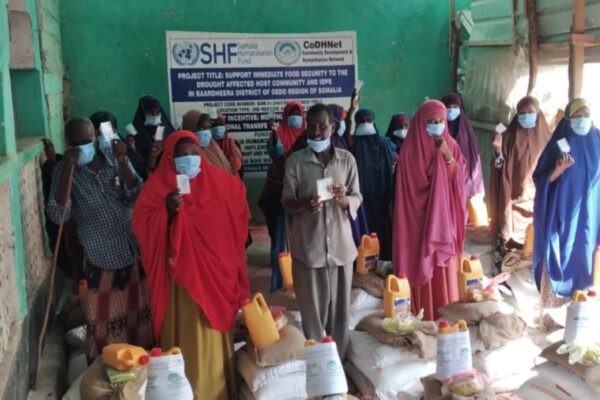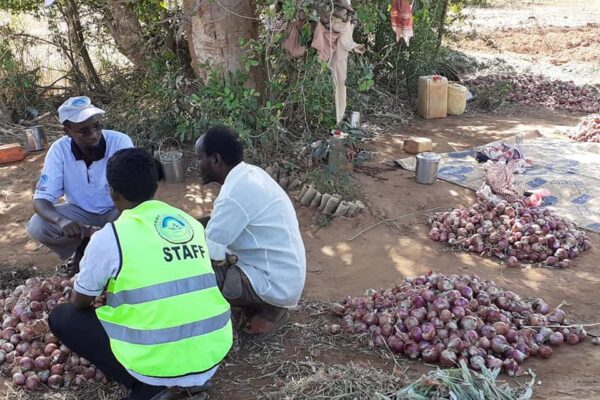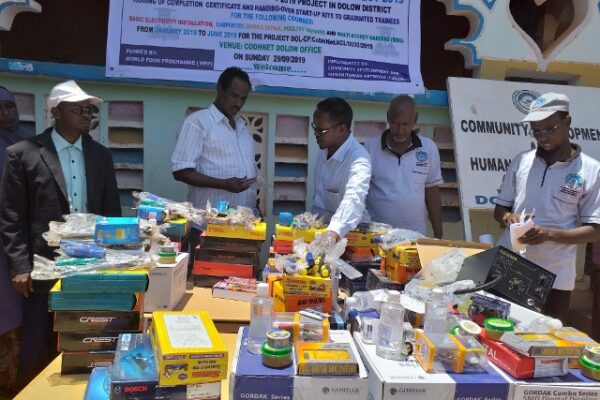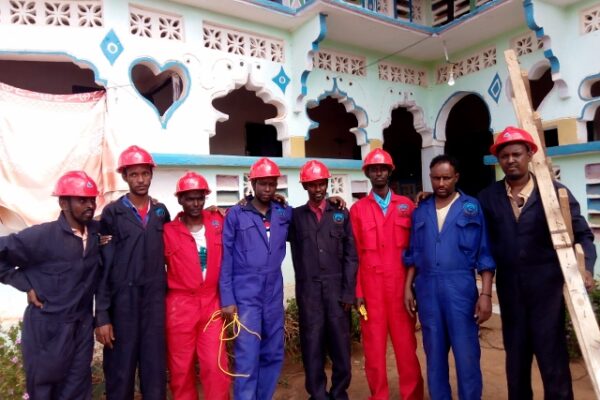- Welcome to Community Development and Humanitarian Network (CoDHNet)
- info@codhnet.org
- AMCO Crystal Apartments, Limuru Road - Parklands/Westlands
- P.O.BOX 38130-00100, GPO Nairobi
Food Security and Livelihoods (FSL)
- Home
- Food Security and Livelihoods (FSL)

UCT Food Voucher implemented by CoDHNet and Funded by OCHA - SHF

Agricultural Support to Farmers

Provision of startup tool kits for job creation.

Vocational Skills Training Supported to 900 trainees of Youth
Food Security and Livelihood (FSL) Programme
The program seeks to improve household financial well-being, food diversification, and social protection. The strategic intervention areas will revolve around access to social safety nets, increased production, and easier market access.
The programme aims is to improve a vulnerable community’s access to sustainable sources of food and income. Food security and livelihood (FSL) is a key area of focus for CoDHNet as it aims to improve the livelihood situation of the vulnerable communities.
In livelihoods, CoDHNet empowers people to overcome poverty by helping them to increase the production capacity of the farmers have access to food supply, improve access to water, generate more income to spend on the basic needs and most of all reduce vulnerability to droughts and conflicts. CoDHNet organization uses multiple approaches like economic empowerment, cash for work, skills development as well as value chain support for agricultural and livestock sub-sectors that secure sustainable livelihoods. CoDHNet targets the most vulnerable community members especially women, girls, PWDs, IDPs, returnees, minority groups among others. We work with the communities, respective government ministries to design and implement sustainable solutions that improve the resilience of the communities.
To improve livelihoods, income and food security, In Somalia, CoDHNet implements a wide range of food security and livelihood support projects such as conditional Food For Training, cash for work to prevent loss of assets, Unconditional emergency food voucher, capacity development in agricultural sector through good agricultural practices, providing agricultural inputs like seeds and farm tools and improving the livestock sector value chain as strategies to promote, protect and strengthen vulnerable communities’ abilities to recover and bounce back from shocks and stresses as well as become resilient. the CoDHNet supports capital assets and economic recovery initiatives like business skills training, provision of business grants and start-up kits, and literacy training support to women and girls owned VSLAs groups. CoDHNet has been reached more people over the year in helping the communities to build their own capacity to respond to crises.
CoDHNet intervene in rural areas where agriculture is a key economic sector. The operation area of CoDHNet programmes are includes Jubbaland State, South West State and Banadir region. In our livelihood programmes CoDHNet targets the most vulnerable people in the community and focuses more on the women headed households as they are most vulnerable.
Agricultural Support
As CoDHNet, Our activities include distributing seeds, fertilizers, farm tools and livestock and usually accompany the inputs with trainings on modern farming techniques. This has enabled the communities to become more self-sufficient through productive farming and livestock rearing. CoDHNet carries out trainings on proper storage techniques and has provided the communities with modern storage facilities such as silos. CoDHNet has been over the years working closely with the farmers in South and Central of Somalia.
Income Generating Activities
CoDHNet implements income generating activities that act as both short term and long term programmes. This is through construction and rehabilitation of infrastructures in the community. The community members usually contribute to the work by providing labour which earns them income. These infrastructures which include canals for irrigation and water catchments and roads contribute a lot to the improvement of livelihoods in the communities. These programmes closely involve communities through the establishment of community committees who are involved in the maintenance of the infrastructures.
Emergencies
In emergency contexts, CoDHNet livelihoods programmes are primarily intended to save lives and protect livelihoods. This is done by providing essential commodities such as food and water for their survival. CoDHNet carries out programmes like provision of unconditional relief to the most vulnerable mostly targeting the elderly, ailing people and lactating women who cannot work. CoDHNet also runs programmes like water trucking and basic food commodities distribution.
Historical, cultural, and current economic circumstances place severe constraints on youth employment. The effects of decades of instability remain evident in the economy and in the skills shortage among youths. The critical importance of personal connections remains a barrier to disadvantaged youths. Constraints to entrepreneurship are presented by lack of capital and financial access.
Asset Creation and Livelihood through Vocational Skills Training
Historical, cultural, and current economic circumstances place severe constraints on youth employment. The effects of decades of instability remain evident in the economy and in the skills shortage among youths. The critical importance of personal connections remains a barrier to disadvantaged youths. Constraints to entrepreneurship are presented by lack of capital and financial access.
Job creation and Livelihood sector
In livelihoods, Despite these substantial challenges, opportunities exist to improve the relevance skills in labour market. Greater engagement with the business community in the design of skill training programs and through apprenticeships and mentorships are methods through which the skill training could help their graduates achieve better employment outcomes. Cooperatives are ways in which the obstacles to entrepreneurship and self-employment, primarily the lack of economic as well as social capital, may be overcome. The viability of cooperatives can be improved through support services such as mentorships and by linking cooperatives to financial services.
Community Development and Humanitarian Network (CoDHNet) empowers people to overcome poverty by helping them to increase the production capacity of the farmers, have access to food supply, improve access to water, generate more income to spend on the basic needs and most of all reduce vulnerability to droughts and conflicts. CoDHNet has been able to reach more people over the year in helping the communities to build their own capacity to respond to crises. CoDHNet frequently intervene in rural areas especially Gedo and Lower shabelle where agriculture is a key economic sector. To improve livelihoods, income and food security of communities in Somalia, CoDHNet assists them with a broad range of activities.
Vocation Skills training Support
As CoDHNet, Our activities include providng startup tool kits and usually accompany with trainings on modern viocational skills courses and farming techniques. This has enabled the communities to become more self-sufficient through productive farming and empolyement opportunity. CoDHNet carries out trainings on Carpentry, pulumbing, beuaty salon, tie and dye, basic electricity installation, mobile repair, poultry farming and Multy-Sory gardens/Kitchen Gardening skills. CoDHNet has been over the years working closely with the farmer organizations in Jubbaland, Banadir and Hir Shabelle.
Job creation Activities
CoDHNet implements income generating activities that act as both short term and long term programmes. This is through vocational skills training courses in the community. The community members usually contribute to the work by providing labour which earns them income. These programmes closely involve communities through the establishment of community committees who are involved in the job placement.

